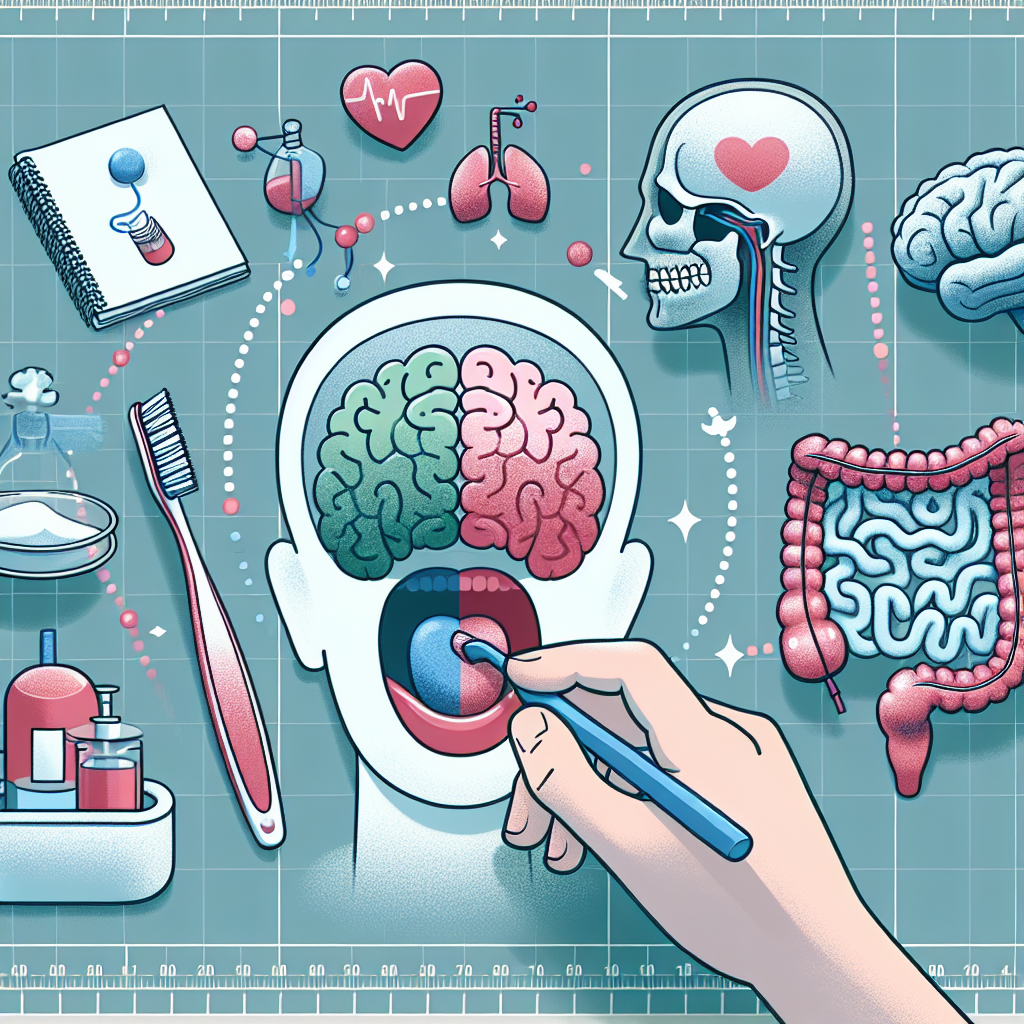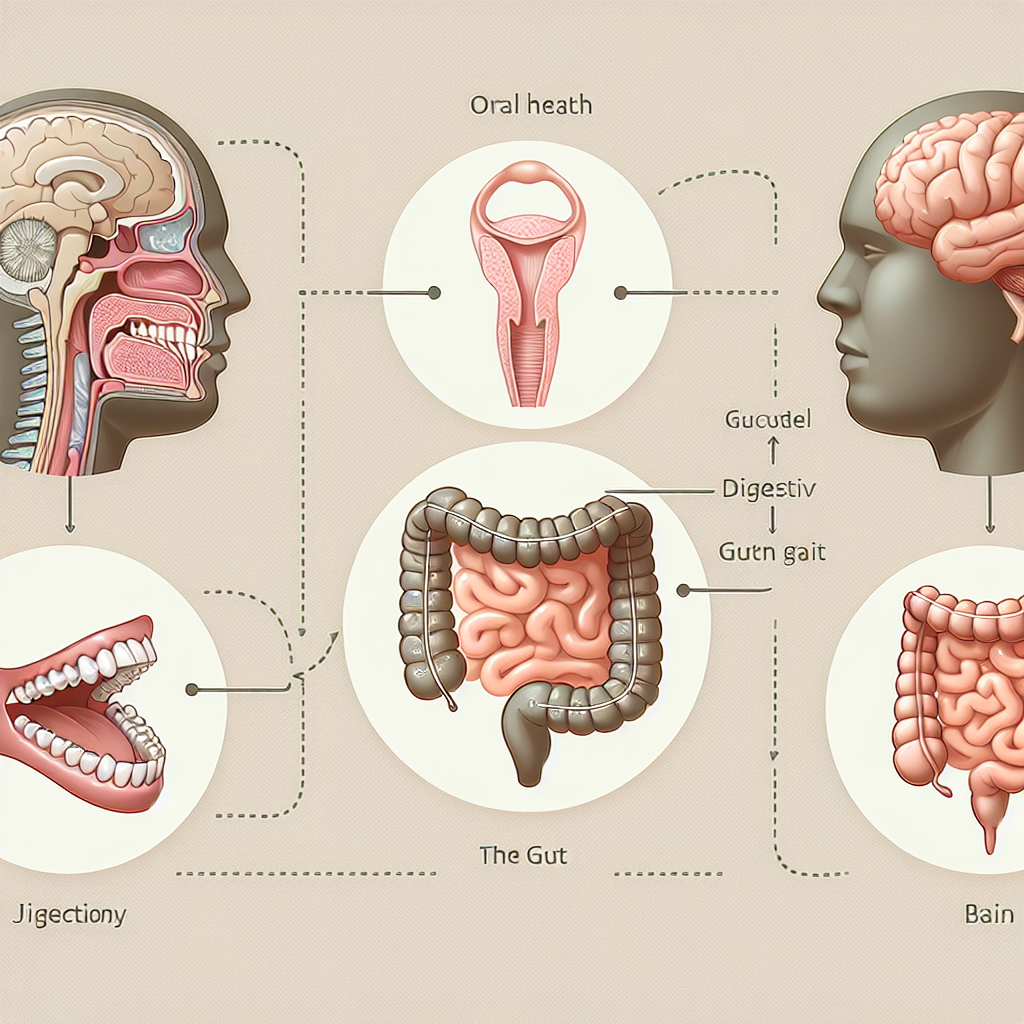The Role of Oral Health in Gut and Brain Connection

Discover more about the crucial role of oral health in the gut and brain connection. Learn how maintaining good oral hygiene can significantly impact your overall health. Visit My Vibrant Vitality now to start your journey towards better health.
Exploring the Link Between Oral Health and Gut-Brain Axis
The role of oral health in the gut-brain connection is a fascinating area of study that is gaining increasing attention in the scientific community. This connection, known as the gut-brain axis, is a complex system of communication between the gut and the brain, which plays a crucial role in maintaining our overall health and well-being. Recent research suggests that oral health, particularly the health of our oral microbiome, may have a significant impact on this gut-brain axis.
The oral microbiome refers to the community of microorganisms, including bacteria, viruses, and fungi, that live in our mouths. These microorganisms play a vital role in maintaining oral health by helping to break down food, protect against harmful pathogens, and support the immune system. However, when the balance of these microorganisms is disrupted, it can lead to oral diseases such as tooth decay and gum disease.
Interestingly, the health of our oral microbiome doesn’t just affect our mouths. It can also have far-reaching effects on other parts of our bodies, including our gut and brain. This is because the microorganisms in our mouths can travel to other parts of our bodies, including our gut, through the food we eat and the air we breathe. Once in the gut, these microorganisms can interact with the gut microbiome, potentially influencing the gut-brain axis.
The gut-brain axis is a bidirectional communication system between the gut and the brain, which allows the two to influence each other. This communication is facilitated by various mechanisms, including the vagus nerve, immune system, and hormones. The gut microbiome plays a crucial role in this communication by producing various substances, including neurotransmitters and metabolites, which can influence brain function.
Research suggests that changes in the gut microbiome, potentially caused by poor oral health, can disrupt this gut-brain communication. This disruption can lead to various health problems, including mental health disorders such as depression and anxiety, neurodegenerative diseases such as Alzheimer’s and Parkinson’s, and gastrointestinal disorders such as irritable bowel syndrome and inflammatory bowel disease.
Moreover, the link between oral health and the gut-brain axis is not just one-way. The brain can also influence oral health through the stress response. Chronic stress can lead to changes in saliva composition, which can disrupt the oral microbiome and increase the risk of oral diseases. This highlights the complex and bidirectional nature of the gut-brain axis and the role of oral health in this system.
In conclusion, maintaining good oral health is not just about preventing tooth decay and gum disease. It may also be crucial for maintaining a healthy gut-brain axis and overall health and well-being. Therefore, it is important to take care of our oral health by practicing good oral hygiene, eating a balanced diet, and regularly visiting the dentist. Further research is needed to fully understand the complex relationship between oral health and the gut-brain axis, but the current evidence suggests that this is an important area of study that could have significant implications for our understanding of health and disease.
The Impact of Oral Health on Gut Microbiome and Brain Function

Oral health is often overlooked when considering overall wellness, but it plays a crucial role in maintaining the balance of our body’s systems. Recent research has revealed a fascinating connection between oral health, the gut microbiome, and brain function. This intricate relationship underscores the importance of maintaining good oral hygiene not just for a radiant smile, but also for optimal gut and brain health.
The mouth is the gateway to the body, and it is home to a diverse community of microorganisms, including bacteria, viruses, and fungi, collectively known as the oral microbiome. This microbiome plays a pivotal role in the initial stages of digestion and immunity. However, when the balance of these microorganisms is disrupted, it can lead to oral diseases such as periodontitis and tooth decay. More importantly, these oral pathogens can enter the bloodstream and travel to other parts of the body, including the gut, causing systemic inflammation and altering the gut microbiome.
The gut microbiome, a complex ecosystem of trillions of bacteria residing in our intestines, is essential for digestion, nutrient absorption, and immune function. It also produces various neurotransmitters and other bioactive molecules that can influence brain function. Therefore, any disruption in the gut microbiome, such as that caused by oral pathogens, can potentially impact brain health.
This brings us to the gut-brain axis, a bidirectional communication system between the gut and the brain. The gut microbiome can influence the brain via this axis, affecting mood, cognition, and mental health. For instance, certain gut bacteria produce neurotransmitters like serotonin and dopamine, which play key roles in mood regulation and cognitive function. Therefore, an imbalance in the gut microbiome, possibly triggered by poor oral health, can disrupt the production of these neurotransmitters, leading to mood disorders and cognitive decline.
Moreover, research has shown that oral pathogens can directly invade the brain, causing neuroinflammation and contributing to neurodegenerative diseases like Alzheimer’s and Parkinson’s. For example, Porphyromonas gingivalis, a bacterium associated with periodontitis, has been found in the brains of Alzheimer’s patients, suggesting a potential link between oral health and this devastating neurological disease.
In addition, poor oral health can lead to chronic systemic inflammation, which is known to affect brain function. Inflammatory molecules produced in response to oral pathogens can cross the blood-brain barrier, triggering inflammation in the brain. This can impair cognitive function and contribute to the development of mental health disorders and neurodegenerative diseases.
In conclusion, the health of our mouth can have far-reaching effects on our gut and brain. Maintaining good oral hygiene is therefore not just about preventing tooth decay and gum disease; it is also about preserving the balance of our gut microbiome and promoting brain health. Regular brushing, flossing, and dental check-ups, along with a healthy diet, can help keep our oral microbiome in check, thereby supporting our gut and brain health. As research continues to unravel the complex connections between oral health, the gut microbiome, and brain function, it becomes increasingly clear that oral health is a critical component of overall wellness.
Understanding the Role of Oral Health in the Gut-Brain Connection
The role of oral health in the gut-brain connection is a fascinating area of study that is gaining increasing attention in the scientific community. This connection, often referred to as the gut-brain axis, is a complex system of communication between the gut and the brain, which plays a crucial role in maintaining our overall health and well-being. Recent research suggests that oral health, particularly the health of our oral microbiome, may play a significant role in this connection.
The oral microbiome refers to the community of microorganisms, including bacteria, viruses, and fungi, that live in our mouths. These microorganisms play a crucial role in maintaining oral health by helping to break down food, protect against harmful pathogens, and support the immune system. However, when the balance of these microorganisms is disrupted, it can lead to oral health problems such as tooth decay and gum disease.
Interestingly, research suggests that the health of our oral microbiome may also have implications for our gut health. This is because the microorganisms in our mouth can travel down to our gut, where they can influence the composition of our gut microbiome. The gut microbiome, in turn, plays a crucial role in digestion, nutrient absorption, and immune function. Therefore, maintaining a healthy oral microbiome may be important for maintaining a healthy gut microbiome.
Moreover, the gut microbiome has been found to communicate with the brain through various mechanisms, including the production of neurotransmitters and other signaling molecules. This communication can influence various aspects of brain function, including mood, cognition, and behavior. Therefore, it is possible that the health of our oral microbiome could indirectly influence our brain health through its effects on the gut microbiome.
Indeed, several studies have found associations between poor oral health and neurological conditions such as Alzheimer’s disease and Parkinson’s disease. While the exact mechanisms underlying these associations are still being investigated, it is thought that inflammation caused by poor oral health could contribute to the development of these conditions. Additionally, certain harmful bacteria that are more common in individuals with poor oral health could potentially travel to the brain and cause damage.
Furthermore, there is evidence to suggest that oral health may also influence mental health. For example, a study published in the Journal of Clinical Periodontology found that individuals with gum disease were more likely to suffer from depression than those without gum disease. This could be due to the inflammation caused by gum disease, which has been linked to the development of depression.
In conclusion, the health of our oral microbiome may play a significant role in the gut-brain connection. By maintaining good oral health, we may be able to support the health of our gut microbiome, which in turn could have positive implications for our brain health. Therefore, oral health should not be overlooked in discussions about the gut-brain connection. It is important to maintain good oral hygiene practices, such as brushing and flossing regularly, and to seek regular dental check-ups to ensure the health of our oral microbiome. As research in this area continues to evolve, it will be interesting to see how our understanding of the role of oral health in the gut-brain connection develops.